DAZZLING
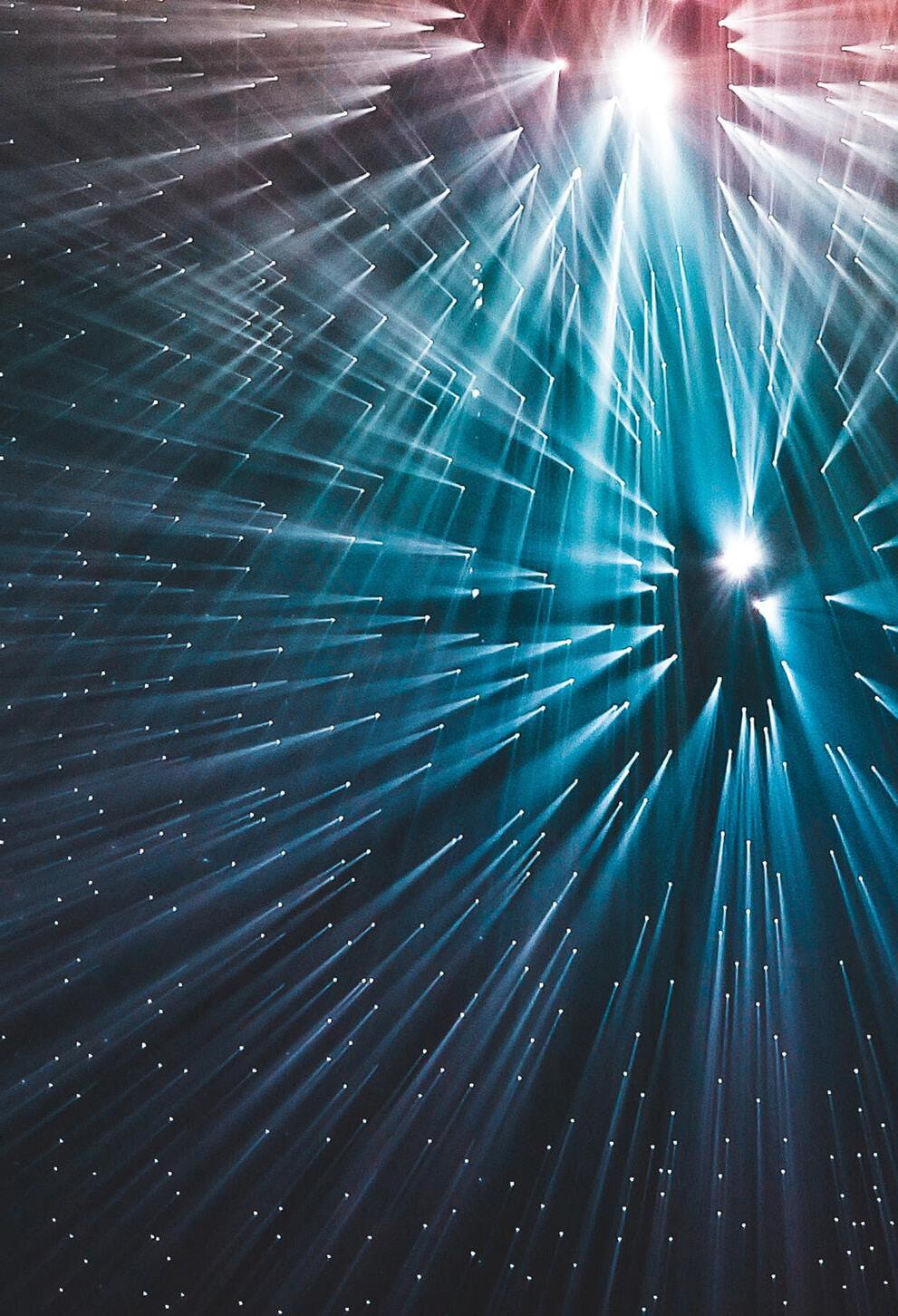


Music Hall, Aberdeen
Thu 16 Mar 2023 7.30pm
Usher Hall, Edinburgh
Fri 17 Mar 7.30pm
City Halls, Glasgow
Sun 19 Mar 7.30pm




















































































































































































































































































































































Tchaikovsky asks the whole orchestra to play ‘with desire and passion’ in his romantic Fifth Symphony; Anna Clyne creates a vision of music as a free spirit, running through the night; and Mozart relaxes with friends in a concerto that reveals him at his graceful, brilliant best. With RSNO Principal Guest Conductor Elim Chan and Scotland’s foremost living pianist, Steven Osborne, standing in for Amadeus himself, every note should go exactly where it belongs – straight to the heart.
ANNA CLYNE This Midnight Hour [12’]
MOZART Piano Concerto No12 in A major K414 [26’]
TCHAIKOVSKY Symphony No5 in E minor Op64 [47’]
Elim Chan Conductor
Steven Osborne Piano
Royal Scottish National Orchestra

MUSIC HALL, ABERDEEN
Thu 16 Mar 2023 7.30pm
USHER HALL, EDINBURGH
Fri 17 Mar 7.30pm
CITY HALLS, GLASGOW
Sun 19 Mar 7.30pm
The Glasgow performance will be recorded for the RSNO Archive. Supported by the Iain and Pamela Sinclair Legacy.
If viewing these notes at the concert, please do so considerately and not during performances. Please silence all mobile telephones and alerts, and refrain from taking photographs, without flash, until the end of each piece.
PTH Thu 30 Mar
EDN Fri 31 Mar
GLW Sun 2 Apr
Brahms Academic Festival Overture
Brahms Symphony No3

Brahms Symphony No2
Thomas Søndergård Conductor
Big Noise Govanhill (Glasgow concert)
Welcome to this evening ’s concert. This week we bid farewell to Principal Guest Conductor Elim Chan, who leaves the role after five years with the RSNO. We’ve been lucky to work with Elim on many exciting projects and concerts over the years. She always brings a spark to orchestral life, and I have particularly fond memories of her joining the Orchestra twice during our Digital Season in 2021. In one of those concerts, when conducting Lutosławski’s Concerto for Orchestra, Elim faced a vast and socially distanced Orchestra and brought the complex piece to life with an effortless energy that lifted all of our spirits in the most challenging of times.

In the same concert, Elim reunited with pianist Benjamin Grosvenor performing Chopin’s Piano Concerto No1. Their recording of this piece with the RSNO won a Gramophone Classical Music Award in 2020. This brilliant recording is just part of the lasting legacy that Elim leaves with us and I’m sure you will join me in thanking her for all her wonderful work with the Orchestra. We look forward to seeing Elim conduct again in Scotland and wish her all the best in the future.
This week sees our first-ever Digital Season concert recorded in Edinburgh, as our digital team mobilises following the temporary closure of the Glasgow Royal Concert Hall. It’s a wonderful opportunity for our online audiences to see the beautiful setting of the Usher Hall, our home in the capital. If you haven’t yet had a chance to watch our concerts online, the 2022:23 Digital Season is available on demand until June. It’s always fascinating to watch the concert filmed from the heart of the stage and gain new insights into the musicians’ work and interaction with the conductor.
Our recent performances at Glasgow’s City Halls have been wonderfully nostalgic for me, a reminder of my first experiences watching the SNO (as it then was) play when I was still at school. As we look forward to the Royal Concert Hall reopening next month, it’s great also to be reminded of the wealth of amazing venues we have in Scotland.
Alistair Mackie CHIEF EXECUTIVE




































































La musica; – mujer desnuda, corriendo loca por la noche pura!
Jiménez’s poem is very short and concise (translation by Robert Bly):
Music –a naked woman running mad through the pure night
FIRST PERFORMANCE
L’Orchestre national d’Île de France, Plaisir, 13 November 2015
DURATION 12 minutes
The opening to This Midnight Hour is inspired by the character and power of the lower strings of L’Orchestre national d’Île de France. From here, it draws inspiration from two poems –one by Charles Baudelaire and another by Juan Ramón Jiménez. While it is not intended to depict a specific narrative, my intention is that it will evoke a visual journey for the listener.
This immediately struck me as a strong image and one that I chose to interpret with outbursts of frenetic energy – for example, dividing the strings into sub-groups that play fortissimo, staggered, descending cascade figures from left to right in stereo effect. This stems from my early explorations of electroacoustic music.
There is also a lot of evocative sensory imagery in Baudelaire’s Harmonie du soir, the first stanza of which reads as follows (translation by William Aggeler):
The season is at hand when swaying on its stem
Every flower exhales perfume like a censer; Sounds and perfumes turn in the evening air; Melancholy waltz and languid vertigo!
I riffed on the idea of the sad waltz about halfway into This Midnight Hour; I split the viola section in two and have one half playing at written pitch and the other half playing 1/4 tone sharp to emulate the sonority of an accordion playing a Parisian-esque waltz.
© Anna Clyne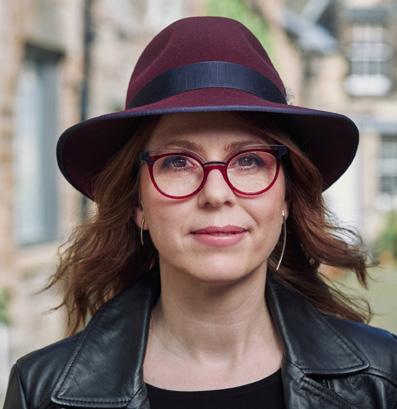
Voici venir les temps où vibrant sur sa tige
Chaque fleur s’évapore ainsi qu’un encensoir; Les sons et les parfums tournent dans l’air du soir; Valse mélancolique et langoureux vertige!
Chaque fleur s’évapore ainsi qu’un encensoir; Le violon frémit comme un coeur qu’on afflige; Valse mélancolique et langoureux vertige!
Le ciel est triste et beau comme un grand reposoir.
Le violon frémit comme un coeur qu’on afflige, Un coeur tendre, qui hait le néant vaste et noir!
Le ciel est triste et beau comme un grand reposoir; Le soleil s’est noyé dans son sang qui se fige.
Un coeur tendre, qui hait le néant vaste et noir, Du passé lumineux recueille tout vestige!
Le soleil s’est noyé dans son sang qui se fige ... Ton souvenir en moi luit comme un ostensoir!
The season is at hand when swaying on its stem Every flower exhales perfume like a censer; Sounds and perfumes turn in the evening air; Melancholy waltz and languid vertigo!
Every flower exhales perfume like a censer; The violin quivers like a tormented heart; Melancholy waltz and languid vertigo!
The sky is sad and beautiful like an immense altar.
The violin quivers like a tormented heart, A tender heart, that hates the vast, black void!
The sky is sad and beautiful like an immense altar; The sun has drowned in his blood which congeals ...
A tender heart that hates the vast, black void Gathers up every shred of the luminous past!
The sun has drowned in his blood which congeals ... Your memory in me glitters like a monstrance!
Translation by William AggelerDescribed as a ‘composer of uncommon gifts and unusual methods’ in a New York Times profile, GRAMMY-nominated Anna Clyne is one of the most in-demand composers today, working with orchestras, choreographers, filmmakers and visual artists around the world. She was named the 8th most performed contemporary composer and the most performed living female British composer in 2022.
Clyne has been commissioned and presented by the world’s most dynamic and revered arts institutions, including the Barbican, Carnegie Hall, Kennedy Center, Los Angeles Philharmonic, MoMA, Philharmonie de Paris, Royal Concertgebouw Orchestra, San Francisco Ballet and Sydney Opera House. Her music has opened such events as the Edinburgh International Festival, The Last Night of the Proms and the New York Philharmonic’s 2021/22 season.
Clyne often collaborates on creative projects across the music industry, including Between the Rooms, a film with choreographer Kim Brandstrup and LA Opera, as well as the Nico Project at the Manchester International Festival, a stage work about pop icon Nico’s life that featured Clyne’s reimagining of The Marble Index for orchestra and voices. Clyne has also reimagined tracks from Thievery Corporation’s The Cosmic Game for the electronica duo with orchestra, and her music has been programmed by such artists as Björk.
Several recent projects have explored Clyne’s fascination with visual arts, including Color Field, inspired by the artwork of Mark Rothko, and Abstractions, inspired by five contemporary artworks. In January 2023 Clyne presented a three-part series for BBC Radio 3 called The Art of Music with Anna Clyne
Recent projects in collaboration with the dance world have included the world premiere of choreographer Pam Tanowitz’s dance set to Breathing Statues for the Royal Ballet in London and performances of DANCE by the San Francisco Ballet with choreography by Nicolas Blanc. Other recent collaborators include such notable musicians as Jess Gillam, Martin Fröst, Pekka Kuusisto and Yo-Yo Ma.
In 2022/23 Clyne serves as Composer-inResidence with the Philharmonia Orchestra and the Trondheim Symphony Orchestra, as well as with the Helsinki Philharmonic Orchestra in the 2023–24 season. Past residencies include the Baltimore Symphony Orchestra, Chicago Symphony Orchestra, L’Orchestre national d’Îlede-France and Scottish Chamber Orchestra.
Clyne’s music is represented on several labels and her works Prince of Clouds and Night Ferry were nominated for 2015 GRAMMY Awards. Her cello concerto DANCE, recorded by soloist Inbal Segev, the London Philharmonic Orchestra and Marin Alsop, has garnered more than seven million plays on Spotify.
Anna Clyne’s music is published exclusively by Boosey & Hawkes.
Vienna, 1783
DURATION 26 minutes
2. Andante
One of Mozart’s most urgent concerns on settling permanently in Vienna with his new wife was to establish himself financially. One of the best ways he found to do this was to write and play piano concertos, thus serving the double function of promoting himself as composer and performer. He describes his busy life in a letter to his father of 28 December 1782:
Altogether I have so much to do that I often don’t know where to start; – the whole morning until 2 o’clock is devoted to lessons; – then we eat; – after lunch I must give my poor stomach at least a short hour to recover; then – it is only in the evening when I can compose. The concertos are in fact something intermediate between too difficult and too easy – they are very brilliant – fall pleasantly on the ear – without of course becoming vapid – here and there only connoisseurs can derive satisfaction – but in such a way that the non-connoisseur will be pleased without knowing why.
These first three piano concertos (Nos 11, 12 and 13) were offered for sale on 15 January 1783 in the Wiener Zeitung:
Herr Kapellmeister Mozart announces herewith to the highly respected public the issuance of three newly completed piano concertos. These 3 concertos, which can be performed with a large orchestra including
wind instruments, or only a quattro, that is with 2 violins, 1 viola and violoncello, will be available at the beginning of April to those who have subscribed for them (they will be beautifully copied and revised by him personally).
The opening movement of tonight’s concerto, which more than the others in the set suggests the intimacy of chamber music, is dominated by two themes – a graceful principal subject and a march-like dialogue between violins and violas. The piano elaborates both ideas while introducing several of its own.
The main theme of the Andante quotes, refines and elaborates that of the brief central Andante grazioso from the overture J C Bach wrote for a revival of Galuppi’s La calamità de’ cuori. When Mozart heard of the death of ‘the London Bach’, with whom he had studied briefly, he wrote to his father: ‘I suppose you have heard that the English Bach is dead? What a loss to the musical world!’ In this deeply-felt movement, which may very well be a deliberate act of homage to his friend and mentor, Mozart harmonises Bach’s solemn theme much more richly and fully than did its author.
In contrast, the finale is a lightweight Rondeau which features only two episodes, both closely related to the spirited principal theme.
© Mark Fielding
Tchaikovsky’s music, which does not appear specifically Russian to everybody, is often more profoundly Russian than music which has long since been awarded the facile label of ‘Muscovite picturesqueness’. While not specifically cultivating in his art the ‘soul of the Russian peasant’, Tchaikovsky drew unconsciously from the true, popular sources of our race.
St Petersburg, 17 November 1888
DURATION 47 minutes
1. Andante–Allegro con anima
2. Andante cantabile, con alcuna licenza
3. Valse: Allegro moderato
4. Andante maestoso–Allegro vivace
The Fifth Symphony was composed at a time when Russian nationalism had reached fever pitch. There was constant bickering in the press over an apparent conflict between Tchaikovsky’s own Muscovite school and the Kutchka (or ‘Mighty Handful’) – Balakirev, Borodin, Cui, Mussorgsky and Rimsky-Korsakov – of St Petersburg. The latter were perceived as true patriots, proudly upholding Russia’s musical heritage, whereas Tchaikovsky was dismissed as a cosmopolitan. It was Igor Stravinsky who later rebalanced the situation. He reasoned:
For many years Tchaikovsky’s three great ballet scores – Swan Lake, The Sleeping Beauty and The Nutcracker – struggled to gain full acceptance due to their epic symphonic sweep, while ironically his symphonies were derided for their balletic leanings. In a 1948 essay entitled The Art of Judging Music, the American composer Virgil Thompson dismissed Tchaikovsky’s symphonies (alongside those of Shostakovich and Sibelius) as music that ‘does not fully or long occupy an adult mind’. It was left to the distinguished musicologist Hans Keller to pose the provocative question, ‘Where would Mahler’s and indeed Schoenberg’s symphonic structures be without Tchaikovsky’s many formal innovations?’
Invariably plagued by self-doubts following the completion of a new score, Tchaikovsky appears to have been exceptionally gloomy regarding the Fifth Symphony, panicking in a letter to his patron Nadezhda von Meck: ‘Am I really played out as they say? Is the rehashing of old ideas and formulae all I am really capable of?’ His despondency turned to paranoia following the 1888 premiere, after which he chose to interpret the rapturous standing ovation as ‘motivated by my earlier work’, and stupefyingly concluded that it ‘didn’t really please the audience’. It was only after the Symphony had been lavished with praise around the world that he grudgingly conceded to his nephew, Lev Davidov, that ‘perhaps it is not so bad after all’.
The Fifth has proved the most enduringly popular of Tchaikovsky’s seven symphonies (Nos 1-6 and the Manfred). Its captivating fusion of Germanic symphonic structure (via Schumann) and the French balletic tradition of Adam and Delibes, coupled with its indelible melodic charm, raw emotional power and overwhelming sense of a glorious triumph won in the face of extreme adversity, has guaranteed it an immortal place in the history of the genre.
Like its immediate predecessor, the Fifth Symphony’s structural progress is articulated and inspired by an opening motto theme (first heard in the clarinet) symbolising Fate, its many appearances signalled in a way that suggests an underlying emotional narrative. This infinitely subtle technique allows Tchaikovsky to constantly reinvigorate his materials, providing the audience with a stream of apparently fresh ideas that yet possess an unerring sense of belonging together.
For example, during the slow movement the motto cries out with searing intensity towards the end, played by the brass, underpinned by thundering timpani. The clarinet steals in with the Fate motif at the close of the waltz-like third movement, and then, utterly transformed in the major key, it introduces the finale and caps it in a blaze of overwhelming affirmation. For some commentators, this unrestrained outburst of triumphalism has an almost Shostakovichlike ring of a hollow victory about it, as though Tchaikovsky’s pulverising of Fate into submission is laced with withering irony. Whatever the truth of the matter, judging by the brooding melancholy and inexorable despair of his Sixth (Pathétique) Symphony, the battle with his inner demons was certainly far from over.
© Julian Haylock13 Jan The National Geographic Society was founded in Washington, DC
26 Jan The Lawn Tennis Association was formed, 11 years after the first Wimbledon championship
8 May The International Exhibition of Science, Art and Industry opened in Glasgow’s Kelvingrove Park
2 Jul About 200 women and teenaged girls at the Bryant & May match factory in Bow, London went on strike, the result of an article on their working conditions by campaigning journalist Annie Besant
1 Aug Carl Benz was issued with the first worldwide driving licence by the Grand Duchy of Baden
31 Aug The body of Mary Ann Nichols, a prostitute, was found in Whitechapel, and considered the first victim of Jack the Ripper
4 Sep George Eastman registered the trademark Kodak and received a patent for his roll-film camera
3 Nov The Royal Concertgebouw Orchestra gave its first performance in Amsterdam’s new concert hall
6 Nov Democratic Party incumbent Grover Cleveland lost the electoral college to Republican Benjamin Harrison, who became the 23rd US President
23 Dec During a bout of mental illness, Dutch painter Vincent van Gogh cut off part of his left ear
Concerto performances take Osborne to major orchestras all over the world with repertoire ranging from Mozart, Beethoven, Brahms, Ravel, Rachmaninov, Shostakovich and Messiaen through to Tippett, Britten and Julian Anderson, who dedicated his 2017 Piano Concerto to Steven. The 2022/23 season sees him return to the London Philharmonic Orchestra to perform the Tippett Piano Concerto with Ed Gardner, and performances with the Stuttgart Philharmonic, BBC Philharmonic, RSNO, Ulster Orchestra, Singapore Symphony, West Australian Symphony, Adelaide Symphony and Orquestra Sinfônica do Estado de São Paulo.
Steven Osborne is one of Britain’s most treasured musicians whose insightful and idiomatic interpretations of diverse repertoire show an immense musical depth. His numerous awards include The Royal Philharmonic Society Instrumentalist of the Year, two BBC Music Magazine Awards and two Gramophone Awards. His residences at London’s Wigmore Hall, Antwerp’s deSingel, Bath International Music Festival, Antwerp Symphony Orchestra, City of Birmingham Symphony Orchestra and RSNO are a testament to the respect he commands.
Osborne’s recitals are publicly and critically acclaimed, and his 2022/23 programmes revisit his recent recording repertoire of Beethoven and Rachmaninov interspersed with his own improvisations and another of his much-admired composers, Schubert. Osborne has performed at many of the world’s most prestigious venues, including the Wiener Konzerthaus, Amsterdam Concertgebouw, Berlin Philharmonie, Hamburg Elbphilharmonie, Suntory Hall Tokyo and Kennedy Center Washington, and he is a regular guest at New York’s Lincoln Center and the Wigmore Hall.
A label artist with Hyperion since 1998, Osborne’s recordings have accumulated numerous awards in the UK, France, Germany and the USA, including two Gramophone Awards, three Preis der Deutschen Schallplattenkritik Awards and a Choc in Classica Magazine. His recordings span a wide range of repertoire, including Beethoven, Schubert, Debussy, Ravel, Liszt, Stravinsky, Prokofiev, Rachmaninov, Medtner, Messiaen, Britten, Tippett, Crumb and Feldman.
Steven Osborne won first prize at the prestigious Clara Haskil Competition (1991) and the Naumburg International Competition (1997). Born in Scotland, he studied with Richard Beauchamp at St Mary’s Music School in Edinburgh and Renna Kellaway at the Royal Northern College of Music in Manchester. He is Visiting Professor at the Royal Academy of Music and the Royal Conservatoire of Scotland, Patron of the Lammermuir Festival and in 2014 was elected a Fellow of the Royal Society of Edinburgh. He was appointed an Officer of the Order of the British Empire (OBE) for services to music in the 2022 Queen’s New Year Honours.

Musikverein devotes a three-part series of concerts to her, profiling her work and including not only her debut with the Vienna Symphony Orchestra but also concerts with the ORF Vienna Radio Symphony Orchestra and Deutsche Kammerphilharmonie Bremen. She also tours Spain with the Antwerp Symphony Orchestra.
The precision of Elim Chan’s gestures, combined with the natural plasticity of her way of shaping the music, has been hugely admired not only in North America but also in Europe. In January 2022 the Boston Classical Review spoke of a ‘marvel of control and understanding’ following her debut with the Boston Symphony Orchestra, while her first appearance with the Cleveland Orchestra a few months later elicited a no less enthusiastic response.
No other conductor of her generation is as sought after by top-flight orchestras in both North America and Europe as Elim Chan, and no other can be found working with comparably outstanding soloists. Born in Hong Kong in 1986, she performs an unusually wide-ranging repertoire of symphonic works extending from the Classical to the present day.
Elim Chan has been Principal Conductor of the Antwerp Symphony Orchestra since 2019, and Principal Guest Conductor of the RSNO since 2018. During the 2022/23 season the Vienna
Other highlights of the 2022/23 season include her debuts with the Pittsburgh and San Francisco Symphony orchestras, appearances with orchestras in Toronto, Cincinnati and Atlanta and her return to the Los Angeles Philharmonic. In Europe she makes her debut with the Orchestre de Paris and conducts concerts with the Oslo Philharmonic, Finnish Radio Symphony Orchestra and Deutsches SymphonieOrchester Berlin.
Elim Chan studied at Smith College, Northampton, Massachusetts, and at the University of Michigan. In 2014 she was the first female winner of the Donatella Flick Conducting Competition, enabling her to spend the 2015/16 season as assistant conductor at the London Symphony Orchestra, where she worked closely with Valery Gergiev. For the following season she joined the Dudamel Fellowship programme of the Los Angeles Philharmonic. She also owes much to the support and encouragement of the late Bernard Haitink, whose masterclasses she attended in Lucerne in 2015.

Formed in 1891 as the Scottish Orchestra, the company became the Scottish National Orchestra in 1950, and was awarded Royal Patronage in 1977. The Orchestra’s artistic team is led by Danish conductor Thomas Søndergård, who was appointed RSNO Music Director in October 2018, having previously held the position of Principal Guest Conductor. Hong Kong-born conductor Elim Chan succeeds Søndergård as Principal Guest Conductor.

The RSNO performs across Scotland, including concerts in Glasgow, Edinburgh, Dundee, Aberdeen, Perth and Inverness. The Orchestra appears regularly at the Edinburgh International Festival and the BBC Proms, and has made recent tours to the USA, China and Europe.
The Orchestra is joined for choral performances by the RSNO Chorus, directed by Stephen Doughty. The RSNO Chorus evolved from a choir formed in 1843 to sing the first full performance of Handel’s Messiah in Scotland. Today, the RSNO Chorus is one of the most distinguished large symphonic choruses in Britain. The Chorus has performed nearly every work in the standard choral repertoire, along with contemporary works by composers including John Adams, Howard Shore and Sir James MacMillan.
The RSNO has a worldwide reputation for the quality of its recordings, receiving a 2020 Gramophone Classical Music Award for Chopin’s Piano Concertos (soloist: Benjamin Grosvenor), conducted by Elim Chan; two Diapason d’Or awards for Symphonic Music (Denève/Roussel 2007; Denève/Debussy 2012) and eight GRAMMY Awards nominations. Over 200 releases are available, including Thomas Søndergård conducting Strauss (Ein Heldenleben, Der Rosenkavalier Suite) and Prokofiev (Symphonies Nos1 and 5), the complete symphonies of Sibelius (Gibson), Prokofiev (Järvi), Bruckner (Tintner) and Roussel (Denève), as well as further discs championing the music of William Grant Still (Eisenberg), Xiaogang Ye (Serebrier) and Thomas Wilson (Macdonald).
The RSNO’s pioneering learning and engagement programme, Music for Life, aims to engage the people of Scotland with music across key stages of life: Early Years, Nurseries and Schools, Teenagers and Students, Families, Accessing Lives, Working Lives and Retired and Later Life. The team is committed to placing the Orchestra at the centre of Scottish communities via workshops and annual residencies.
FIRST VIOLIN
Maya Iwabuchi
LEADER
Tamás Fejes
ASSISTANT LEADER
Patrick Curlett
Wen Wang
Susannah Lowdon
Lorna Rough
Liam Lynch
Alan Manson
Veronica Marziano
Elizabeth Bamping
Caroline Parry
Ursula Heidecker Allen
Gillian Risi
Catherine James
SECOND VIOLIN
Helena Buckie
GUEST PRINCIPAL
Jacqueline Speirs
Marion Wilson
Nigel Mason
Sophie Lang
Paul Medd
Robin Wilson
Anne Bünemann
Harriet Hunter
John Robinson
Kirstin Drew
Eddy Betancourt
VIOLA
Tom Dunn
PRINCIPAL
Felix Tanner
Lisa Rourke
Claire Dunn
Maria Trittinger
Francesca Hunt
David McCreadie
Elaine Koene
Marsailidh Groat
Mariya Sotirova
CELLO
Pei-Jee Ng
PRINCIPAL
Betsy Taylor
Kennedy Leitch
Rachael Lee
Sarah Digger
Robert Anderson
Gunda Baranuaskaitė
William Paterson
DOUBLE BASS
Lynda Houghton
GUEST PRINCIPAL
Michael Rae
Moray Jones
Alexandre dos Santos
Tom Berry
Evangelos Saklaras
Olaya Garcia Alvarez
FLUTE
Harry Winstanley
GUEST PRINCIPAL
Helen Brew
Mark Taylor
OBOE
Adrian Wilson
PRINCIPAL
Peter Dykes
CLARINET
Timothy Orpen
PRINCIPAL
Duncan Swindells
PRINCIPAL BASS CLARINET
BASSOON
Luis Eisen
ASSOCIATE PRINCIPAL
Paolo Dutto
PRINCIPAL CONTRABASSOON
HORN
Diana Sheach
GUEST PRINCIPAL
Alison Murray
Andrew McLean
Stephanie Jones
Martin Murphy
TRUMPET
Christopher Hart
PRINCIPAL
Simon Bird
TROMBONE
Dávur Juul Magnussen
PRINCIPAL
Lance Green
Alastair Sinclair
PRINCIPAL BASS TROMBONE
TUBA
John Whitener
PRINCIPAL
TIMPANI
Paul Philbert
PRINCIPAL
PERCUSSION
John Poulter
ASSOCIATE PRINCIPAL
Lauren O’Malley
HARP
Pippa Tunnell
7 April 2023, 7pm
New Auditorium, Glasgow Royal Concert Hall
John Butt Director Andrew Tortise Evangelist Neal Davies Christus
Tickets: £6 – £25 0141 353 8000 glasgowlife.org.uk
FEATURING MUSIC FROM STAR WARS • JURASSIC PARK • SUPERMAN E.T. THE EXTRA-TERRESTRIAL AND MORE!

ABN THU 23 MAR 2023 EDN FRI 24 MAR 2023 GLW SAT 25 MAR 2023

rsno.org.uk
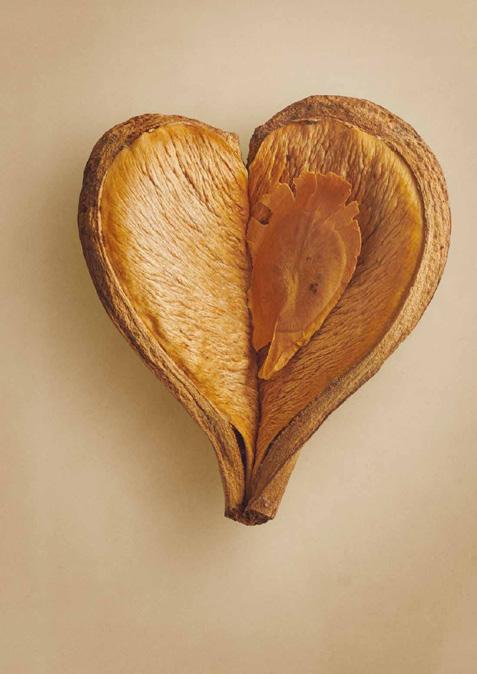
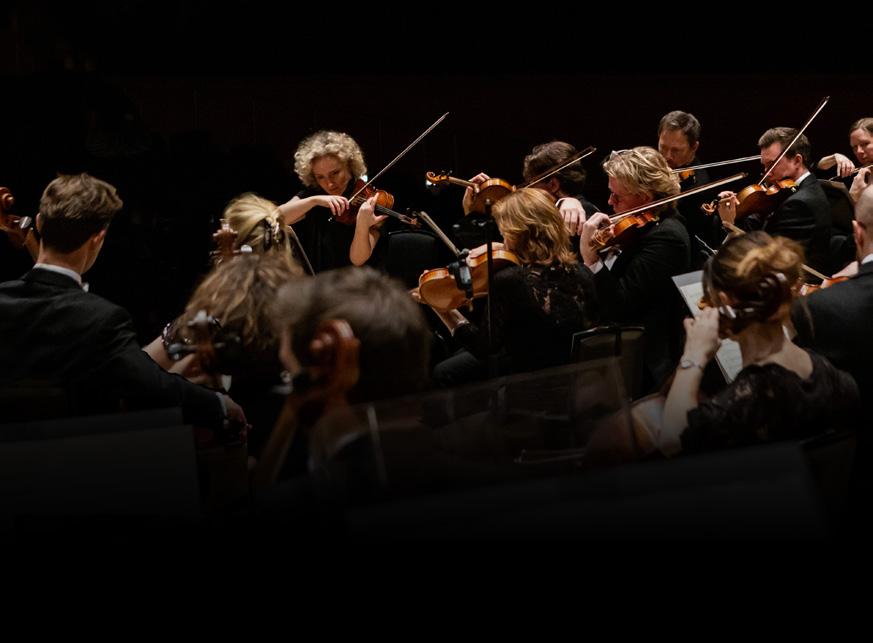
I am honoured and extremely proud to be Music Director of the RSNO. It is through the continued generosity of you, our friends, donors and supporters, that we can continue to achieve and realise the most ambitious goals of the Orchestra.
One of the wonders of the RSNO is how it brings high-quality music not only to concert halls, but to the wider community. From hospital settings to care homes, from our Astar app for families with newborns to our National Schools Concert Programme, our music touches so many lives in Scotland and beyond.
RSNO Benefactors are beacons of philanthropic inspiration, providing truly transformative financial support to the Orchestra that enables us to build and deliver long-term strategic plans. Benefactors share the RSNO’s vision
Your support is the cornerstone of all that we do, as it allows us to continually build and develop.
Thank you for being part of this wonderful Orchestra’s journey, as we adapt and grow towards a bright future.
Thomas Søndergårdfor orchestral music and work with us to drive the organisation forward, helping us to realise our future plans and ambitions.
Sir Ewan and Lady Brown
Gavin & Kate Gemmell
The RSNO Conductors’ Circle is an inspirational group of individual supporters at the heart of the RSNO’s Individual Giving programme. Our members’ annual philanthropic gifts enable us to realise the Orchestra’s most ambitious goals. Conductors’ Circle members support inspirational concert performances for our audiences alongside transformational education programmes in communities across Scotland, via our ground-breaking initiative Music for Life.
The RSNO is very grateful for the continued support of its Conductors’ Circle:
Ardgowan Charitable Trust

Geoff and Mary Ball
Stina Bruce Jones
Ian and Evelyn Crombie
Carol Grigor and the Trustees of Dunard Fund
Kenneth and Julia Greig
Ms Chris Grace Hartness
Kat Heathcote and Iain Macneil
Bruce and Caroline Minto
David and Alix Stevenson
Eric and Karen Young
We would also like to thank those generous donors who wish to remain anonymous.
For more information on becoming a Benefactor or part of the Conductors’ Circle, please contact Jenny McNeely at jenny.mcneely@rsno.org.uk
CHAIR PATRON
From musical activities in schools with the musicians of the future to working in community venues across Scotland, as a Chair Patron you are enabling RSNO musicians to explore the many facets of their art and the positive impact it has on people’s lives. Supporting an individual musician puts you at the heart of the RSNO family. You’re connected directly to the musicians on stage and get to enjoy privileged behind-the-scenes access. RSNO musicians truly appreciate our Chair Patrons and enjoy developing personal relationships with our supporters.
Assistant Conductor
Kellen Gray
The Solti Foundation Chair
First Violin
Maya Iwabuchi LEADER
Sharon Roffman LEADER
Dunard Fund Chair
Tamás Fejes ASSISTANT LEADER
The Bill and Rosalind Gregson Chair
Patrick Curlett
ASSISTANT PRINCIPAL
The RSNO Circle Chair
Alan Manson
The Hugh and Linda Bruce-Watt Chair
Elizabeth Bamping
The WL and Vera Heywood Chair
Ursula Heidecker Allen
The James and Iris Miller Chair
Lorna Rough
The Hilda Munro Chair
Second Violin
Marion Wilson
ASSOCIATE PRINCIPAL
The Nigel and Margot Russell Chair
Sophie Lang
The Ian and Evelyn Crombie Chair
Viola
Tom Dunn PRINCIPAL
The Cathy & Keith MacGillivray Chair
Lisa Rourke SUB PRINCIPAL
The Meta Ramsay Chair
Francesca Hunt
The Rolf and Celia Thornqvist Chair
Cello
Betsy Taylor
ASSOCIATE PRINCIPAL
The Maxwell Armstrong Chair
Kennedy Leitch
ASSISTANT PRINCIPAL
The David and Anne Smith Chair
Rachael Lee
The Christine and Arthur Hamilton Chair
Double Bass
Michael Rae
James Wood Bequest Fund Chair
With thanks to the Gregor Forbes John Clark Chair for its support of the RSNO Double Bass section Flute
Katherine Bryan PRINCIPAL
The David and Anne Smith Chair
Helen Brew ASSISTANT PRINCIPAL
The Gordon Fraser Charitable Trust Chair
Oboe
Adrian Wilson PRINCIPAL
The Hedley Wright Chair
Peter Dykes
ASSOCIATE PRINCIPAL
Witherby Publishing Group Charitable Trust Chair
Cor Anglais
Henry Clay PRINCIPAL
In memory of a dear friend, Fiona H
Bassoon
David Hubbard PRINCIPAL
The James and Morag Anderson Chair
Horn
Christopher Gough PRINCIPAL
The Springbank Distillers Chair
Martin Murphy
ASSISTANT PRINCIPAL
The John Mather Trust’s Rising Star Chair
Alison Murray
ASSISTANT PRINCIPAL
Mr & Mrs Pierre and Alison Girard
David McClenaghan
The J & A Mitchell Chair
Trumpet
Christopher Hart PRINCIPAL
Ms Chris Grace Hartness
Trombone
Dávur Juul Magnussen
PRINCIPAL
The Mitchell’s Glengyle Chair
Lance Green
ASSOCIATE PRINCIPAL
The William Cadenhead Chair
Timpani
Paul Philbert
Ms Chris Grace Hartness
Percussion
John Poulter
ASSOCIATE PRINCIPAL
The Dot and Syd Taft Chair
Library and Orchestra
Assistant
Xander van Vliet
The Hilda Munro Chair
We would like to acknowledge the generous contribution of Mr Hedley Wright in supporting the RSNO Chair Patron Programme.
Our Learning and Engagement activity is structured around our Music for Life programme. From apps for babies to concerts and workshops for school children, and lunchtime concerts for older adults, the range of projects is vast. As a Patron, you will have access to our projects to bring you closer to the communities we serve across Scotland.
Learning and Engagement Patrons
William Brown, W.S.
Neil and Nicola Gordon
Professor Gillian Mead, FRSE
Mr Maurice Taylor CBE
RSNO Principal Oboe, Adrian Wilson

The RSNO Dundee Circle Committee
Witherby Publishing Group Charitable Trust
The RSNO is dedicated to bringing new works and outstanding new talent to audiences across Scotland. Our New Works Patrons contribute a significant legacy to orchestral music that extends beyond the RSNO, providing new music for orchestras and audiences around the world – for generations to come.
New Works Patron Susie ThomsonWe are also grateful to those who give but wish to remain anonymous.
If you would like more information or would like to discuss how you can become part of the RSNO Family of Supporters, please contact Jenny McNeely, Head of Individual Giving and Partnerships, at jenny.mcneely@rsno.org.uk
We would like to thank all those who have donated to our new Play Your Part Appeal. The generosity of our supporters at this time is deeply appreciated.

Leave a gift to the RSNO and ensure future generations can create their own Musical Memories of the Royal Scottish National Orchestra.

We all have special Musical Memories. It could be learning to play an instrument when you were a child, or a special piece of music that just left you breathless the first time you heard the Orchestra play it. Maybe it was seeing a soloist you had always wanted to hear, or just a great concert shared with friends. Memories such as these make music such an important part of our lives.
Leaving a gift to the RSNO in your will is the single most important way you can help us to make music and to create memories. Your legacy will support the work of the Orchestra for years to come, ensuring that we can continue to bring great music to a new generation of children, young people and adults right across Scotland. It is easy to leave a gift. After you have made provisions for family and friends, please think of the Orchestra.
Your gift is important to us and to everyone in Scotland who enjoys music. Contact your solicitor to draft a will or add a codicil to your current will.


If your estate is subject to inheritance tax, a gift to a charity, such as the RSNO, is tax-free and will reduce the amount of tax payable to the Government. Please ask your solicitor for details.
For more information please visit rsno.org.uk/memories
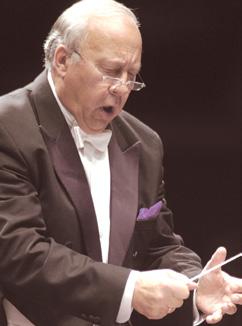

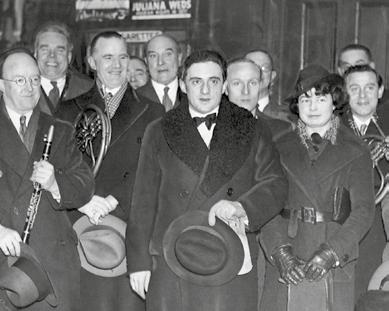



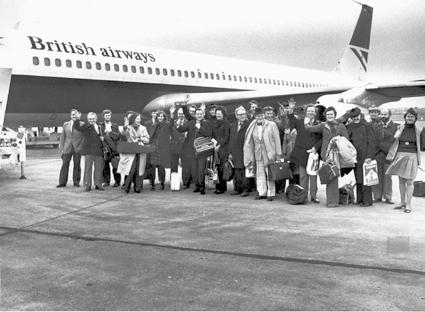
If you would like to discuss this further, please contact Torran McEwan, Individual Giving and Partnerships Officer, in the strictest confidence, at torran.mcewan@rsno.org.uk
To the many among you who have pledged to leave a gift already – thank you.


Charitable trusts and foundations have a distinguished history of supporting the RSNO, both on and off stage. From one-off donations for specific projects to multi-year funding for our flagship outreach initiatives, including the National Schools Concert Programme and Young Creatives, every grant in support of our work is truly appreciated. We are grateful to the following trusts and foundations for their generosity:
Aberdeen Endowments Trust
Alexander Moncur Trust
Alma & Leslie Wolfson Charitable Trust
Balgay Children’s Society
Boris Karloff Charitable Foundation
Castansa Trust
CMS Charitable Trust
Cookie Matheson Charitable Trust
Cruach Trust
Cruden Foundation
David and June Gordon Memorial Trust
D’Oyly Carte Charitable Trust

Dunclay Charitable Trust
Educational Institute of Scotland
Edgar E Lawley Foundation
Ettrick Charitable Trust
Fenton Arts Trust
Forteviot Charitable Trust
Gaelic Language Promotion Trust
Gannochy Trust
Gordon Fraser Charitable Trust
Harbinson Charitable Trust
Hugh Fraser Foundation
Idlewild Trust
James Wood Bequest Fund
Jean & Roger Miller’s Charitable Trust
Jennie S Gordon Memorial Foundation
Jimmie Cairncross Charitable Trust
John Mather Charitable Trust
John Scott Trust Fund
Jones Family Charitable Trust
JTH Charitable Trust
Leach Family Charitable Trust
Leng Charitable Trust
Mary Janet King Fund
McGlashan Charitable Trust
McLay Dementia Trust
MEB Charitable Trust
Meikle Foundation
Mickel Fund
Murdoch Forrest Charitable Trust
Nancie Massey Charitable Trust
Noël Coward Foundation
Northwood Charitable Trust
P F Charitable Trust
Pump House Trust
Q Charitable Trust
Ronald Miller Foundation
R J Larg Family Trust
Russell Trust
Scops Arts Trust
Scott Davidson Charitable Trust
Solti Foundation
Souter Charitable Trust
Stevenston Charitable Trust
Sylvia Aitken Charitable Trust
Tay Charitable Trust
Thomson Charitable Trust
Thriplow Charitable Trust
Tillyloss Trust
Vaughan Williams Foundation
WA Cargill Fund

Walter Craig Charitable Trust
Walter Scott Giving Group
Walton Foundation
Wavendon Foundation
William Syson Foundation
William S Phillips Fund
Zich Trust
We are also grateful to a number of trusts that wish to stay anonymous.
If you would like more information about our work and how you can make a difference, please contact Naomi Stewart, Head of Trusts and Projects, at naomi.stewart@rsno.org.uk


The Circle is a vital part of the RSNO family. Our community of music-lovers inspire and support us. Supporting us by joining the Circle will help us to bring music to so many people, from our Learning and Engagement programmes to our brand-new digital performances. As part of our community and family, we will keep in touch with our exclusive magazine Inner Circle, our Circle member webpage and invitations to special events throughout the year.
To find out more about joining the Circle please visit rsno.org.uk/circle or get in touch with Torran McEwan, Individual Giving and Partnerships Officer, at torran.mcewan@rsno.org.uk
To all our existing Circle members, thank you. Thank you for your unwavering support that allows us to continue sharing the joy of music.
Virtuoso
Ms Catherine Y Alexander
Mrs A M Bennett
Mr Alan and Mrs Carolyn Bonnyman
Dame Susan and Mr John Bruce
Mrs Stina Bruce-Jones
Stephen and Morny Carter
Francesca and Eoghan Contini Mackie
Sir Sandy and Lady Crombie
Gavin and Kate Gemmell
Dr M I and Mrs C R Gordon
Scott and Frieda Grier
Judith and David Halkerston
Iain MacNeil and Kat Heathcote
Miss A McGrory
Miss M Michie
Mr James Miller CBE
Nicholas and Alison Muntz
Meta Ramsay
Mr George Ritchie
Mr P Rollinson
Mr and Mrs W Semple
Mr Ian Taft
Claire and Mark Urquhart
Raymond and Brenda Williamson
Mr Hedley G Wright
Symphony
Mr Anderson
Mr W Berry
Mr John Brownlie
Miss L Buist
Mr and Mrs J K Burleigh
Mrs E Gibb
Mr I Gow
Mr J D Home
Mrs J Kennedy
Mrs A Lamont
Mr I C MacNicol
Professor J and Mrs S Mavor
Mrs McQueen
Mrs A McQueen
Morag Millar
Mr Miller
Mrs A Morrison
Graham and Elizabeth Morton
Mr and Mrs David Robinson
Mr D Rogerson
Mrs Ann M Stephen
Mr Alistair M and Mrs Mandy Struthers
Mr and Mrs M Whelan
Concerto
Dr K Chapman and Ms S Adam
Mr A Alstead
Mr N Barton
Miss D Blackie
Mr L Borwick
Neil and Karin Bowman
Dr C M Bronte-Stewart
Dr F L Brown
Mr and Mrs Burnside
Ms H Calvert
Mr A Campbell
Sir Graeme and Lady Catto
Mr R Cavanagh
Myk Cichla
Dr J Coleiro
Ms R Cormack
Mr and Mrs B H Cross
Christine and Jo Danbolt
Mr P Davidson
Mr J Diamond
Mr S Dunn
Mr C Ffoulkes
Mr and Mrs M Gilbert
Professor J R and Mrs C M Gray
Mrs S Hawthorn
Richard and Linda Holden
Mr N Jack
Ms H Kay
Mr and Mrs W Kean
Mrs M King
Norman and Christine Lessels
Mr R M Love
Mr D MacPherson
Mr R G Madden
Mrs K Mair
Mr and Mrs Marwick
Mr S Marwick
Mr and Mrs G McAllister
Ms M McDougall
Mr Rod McLoughlin
Mrs B Morinaud
Mr A Morrison
Dr and Mrs D Mowle
Dr C C and Mr K R Parish
Mr I Percival
Mr and Mrs D Pirie
Ms A and Miss I Reeve
Mrs E Robertson
Miss L E Robertson
Mr D Rogerson
Ross family
Dr and Mrs G K Simpson
Mr and Mrs A Stewart
Mrs M Stirling
Mr G Stronach
Dr G R Sutherland
Mr I Szymanski
Mr and Dr Tom Thomson
Mr J B and Mrs M B Watson
Mr and Mrs D Weetman
Mrs Wigglesworth
Mr and Mrs Zuckert
Sonata
Ms S Ace
Mr K Allen
Mrs P Anderson
Ms D Baines
Mr O Balfour
Mr N Barton
Dr A D Beattie
Mrs H Benzie
Mr R Billingham
Dr and Mrs Blake
Lord and Lady Borthwick
Rev P Boylan
John Bradshaw and Shiona Mackie
Mr and Mrs Bryan
Lady J Bute
Mrs C Campbell
Miss S M Carlyon
Mr J Claxon
Lady Coulsfield
Adam and Lesley Cumming
Ms K Cunningham
Mr F Dalziel and Mrs S Walsh
Dr J K and Mrs E E Davidson
Mr and Mrs K B Dietz
Mrs C Donald
J Donald and L Knifton
Ms P Dow
Mrs P du Feu
Mr John Duffy
Mr and Mrs M Dunbar
Mr R M Duncan
Brigadier and Mrs C C Dunphie
Mrs E Egan
Mr R Ellis
Miss L Emslie
Mr R B Erskine
Dr E Evans
Mr D Fraser
Mr D and Mrs A Fraser
Mr D Frew
Ms J Gardner
Dr P and Dr K Gaskell
Mr W G Geddes
Mrs M Gibson
Mr D Gibson
Mr and Mrs A Gilchrist
Mrs M Gillan
Mr R M Godfrey
Mrs J K Gowans
Dr J and Mrs H Graham
Professor and Mrs A R Grieve
Mr and Mrs G Y Haig
Lord and Lady Hamilton
Dr P J Harper
Mrs I Harris
Dr N Harrison
Mr and Mrs R J Hart
Mr D Hartman
Ms V Harvey
P Hayes
Dr and Mrs P Heywood
Bobby and Rhona Hogg
Ms J Hope
Mr R Horne
Mr and Mrs F Howell
Mr A Hunter
Mrs A S Hunter
Professor R N Ibbett
Ms J Incecik
Mr A Kilpatrick
Professor and Mrs E W Laing
Ms K Lang
Mr J P Lawson
Mr and Mrs J Lawson
G E Lewis
Dr D A Lunt
Mrs Lesley P Lyon
Mr and Mrs R MacCormick
Mr D MacDonald
Mr and Mrs MacGillivray
Lady Lucinda L Mackay
Dr A K and Mrs J C Martin
Mr and Mrs J Martin
Mr and Mrs D H Marwick
Ms S McArthur
Mr G McCormack
Mrs L McCormick
Mrs M McDonald
Mr M McGarvie
Dr Colin McHardy
Dr A H McKee
Mr Patrick McKeever
Mr G McKeown
Ms H L McLaren
Mrs E McLean
Mr D McNaughton
Professor Mead

Mr and Mrs B Mellon
Mr G Millar
Mr I Mills
Mrs P Molyneaux
Mr B Moon
Mr R Morley
Mr B and Mrs C Nelson
Mr and Mrs K O’Hare
Professor Stephen Osborne and Frank Osborne
Mr and Mrs K Osborne
Dr G Osbourne
Ms S Park
Mr R Parry
Misses J and M Penman
Dr M Porteous
Mr J W Pottinger
Miss J A Raiker
Mr W Ramage
Mr M Rattray
Ms F Reith
Mrs D A Riley
Dr and Mrs D Robb
Mrs A Robertson
Mr I Robertson
Mr H and Mrs J Robson
Ms A Robson
Mrs E K Ross
F Scott
Mrs S Scott
Mrs J Shanks
Mr J A Shipley
Dr M J and Mrs J A Shirreffs
Mr E Simmons
Dr Colin and Mrs Kathleen Sinclair
Mr M Smith
Mr M J Smith
Mrs E Smith
Mr M A Snider
Dr and Mrs B Stack
Mrs Lorna Statham

Mrs T Stevenson
Rev N and Mr R Stewart
Mrs R F Stewart
Mr and Mrs Struthers
Mr and Mrs B Tait
Dr and Mrs T Thomson
Mr C Turnbull
Dr S Tweedie
Dr Morag Ward
Mr Nelson and Mrs Barbara Waters
Mr W Watters
Dr and Mrs T Weakley
Mrs V Wells
Mr G West
Miss M Whitelaw
Dr and Mrs D T Williams
Mr D Woolgar
Mr R Young
Mr C and Mrs L Yule
Thank you to all our members of the Circle, including those who wish to remain anonymous. Every one of you makes a real difference.



PRINCIPAL
PRINCIPAL

BROADCAST
If you would like more information about sponsorships, corporate partnerships or fundraising events with the RSNO, please contact Jenny McNeely, Head of Individual Giving and Partnerships, at jenny.mcneely@rsno.org.uk
PATRON
Her Late Majesty The Queen
RSNO BOARD OF DIRECTORS
Elected Directors
Dame Susan Bruce DBE
CHAIR
John Heasley
HONORARY TREASURER
Kat Heathcote
Linda Holden
Neil McLennan
Costa Pilavachi
CHIEF EXECUTIVE
Alistair Mackie
Phoebe Connolly
EXECUTIVE ASSISTANT
Nicola Shephard
EXECUTIVE ASSISTANT (MATERNITY LEAVE)
CONCERTS
Dr Ingrid Bols
PLANNING OFFICER
Michael Cameron
DRIVER AND DEPUTY STAGE MANAGER
Emma Hunter
DEPUTY ORCHESTRA MANAGER
Ewen McKay
HEAD OF ORCHESTRA MANAGEMENT
Jim O’Brien
DRIVER AND ORCHESTRA TECHNICIAN
Richard Payne
LIBRARIAN
Tammo Schuelke
HEAD OF PLANNING
Craig Swindells
HEAD OF PRODUCTIONS
Matthias Van Der Swaagh
CONCERTS ADMINISTRATOR
Xander van Vliet
LIBRARY ASSISTANT
Christine Walker
CHORUS MANAGER
LEARNING AND ENGAGEMENT
Andy Stevenson
DIRECTOR OF ENGAGEMENT
Samantha Campbell
HEAD OF ENGAGEMENT (MATERNITY LEAVE)
David Robinson
Gurjit Singh Lalli
Jane Wood
Player Directors
Helen Brew
David Hubbard
Dávur Juul Magnussen
Sophie Lang
Paul Philbert
Lorna Rough
Nominated Director
Cllr Edward Thornley
THE CITY OF EDINBURGH COUNCIL
Chrissie Johnson
PROJECT MANAGER
Rosie Kenneally
LEAD PROJECT MANAGER
Rachel O’Connor
CREATIVE ASSISTANT
Rachel Pyke
PROJECT MANAGER
EXTERNAL RELATIONS
Dr Jane Donald
DIRECTOR OF EXTERNAL RELATIONS
Lisa Ballantyne
PARTNERSHIPS OFFICER
Ian Brooke
PROGRAMMES EDITOR
Rosie Clark
EXTERNAL RELATIONS ADMINISTRATOR
Jessica Cowley
MARKETING MANAGER
Carol Fleming
HEAD OF MARKETING
Constance Fraser
COMMUNICATIONS AND MARKETING OFFICER
Torran McEwan
INDIVIDUAL GIVING AND PARTNERSHIPS
OFFICER
Jenny McNeely
HEAD OF INDIVIDUAL GIVING AND PARTNERSHIPS
Mirienne McMillan
SALES OFFICER
Graham Ramage
GRAPHICS AND NEW MEDIA DESIGNER
Kirsten Reid
TRUSTS AND PROJECTS COORDINATOR
Dr Naomi Stewart
HEAD OF TRUSTS AND PROJECTS
Sam Stone
INFORMATION SERVICES MANAGER
Youth Advisory Board
Nina Doig
Erin Findlay
Beth Peat
Annie Unieng
Company Secretary
Gordon Murray
RSNO COUNCIL
Baroness Ramsay of Cartvale
CHAIR
Ms Ruth Wishart
FINANCE AND CORPORATE SERVICES
Angela Moreland
CHIEF OPERATING OFFICER
Abby Dennison
FINANCE ADMINISTRATOR
Alice Gibson
FINANCE ADMINISTRATOR
Ted Howie
FACILITIES COORDINATOR
Lorimer Macandrew
VIDEO PRODUCER
Sam McErlean
SOUND ENGINEERING INTERN
Irene McPhail
ACCOUNTS AND PAYROLL ASSISTANT
Calum Mitchell
VIDEO PRODUCTION INTERN
Hedd Morfett-Jones
DIGITAL MANAGER
Susan Rennie
FINANCE MANAGER
Jade Wilson
FINANCE ASSISTANT
Royal Scottish National Orchestra 19 Killermont Street
Glasgow G2 3NX
T: +44 (0)141 226 3868
W: rsno.org.uk
Scottish Company No. 27809
Scottish Charity No. SC010702
@rsnoofficial Youtube.com/thersno

